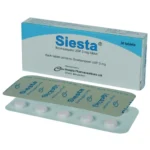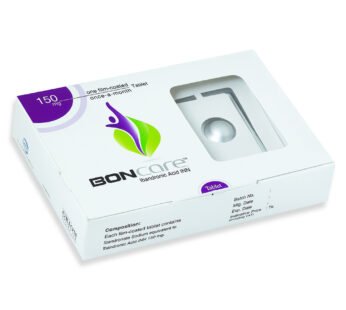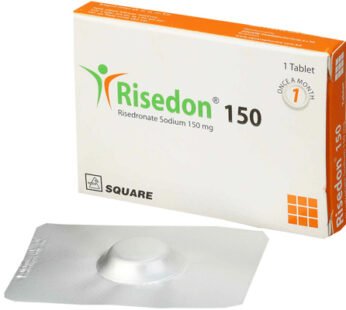Siesta 3 mg
৳ 4.00Spirocard 25 mg
Description
Indications
Spirocard tablet is prescribed for the treatment of conditions such as:
Oedema (fluid retention) and ascites (fluid accumulation in the abdomen) associated with liver cirrhosis, malignant ascites, nephrotic syndrome, congestive heart failure, and primary hyperaldosteronism.
Always follow the advice of your registered healthcare provider when using this medication.
Description
Spirocard is a long-acting aldosterone antagonist. It works by selectively binding to aldosterone receptors, primarily in the distal renal tubule, where it competes with aldosterone at the sodium-potassium exchange sites. This action leads to increased excretion of sodium and water, while promoting the retention of potassium and magnesium. As a result, Spirocard has diuretic effects and is used to manage conditions related to excess fluid retention and elevated blood pressure.
Pharmacology
Spirocard contains spironolactone, a pharmacologically active antagonist of aldosterone. It works by binding to the mineralocorticoid receptors in the renal tubule, preventing aldosterone from enhancing sodium retention and potassium excretion. By blocking aldosterone’s effects, spironolactone promotes the excretion of sodium and water while retaining potassium. This mechanism not only helps with fluid management but also lowers blood pressure, making spironolactone effective for treating conditions like heart failure, hypertension, and hyperaldosteronism. It may be used alone or in combination with other diuretics that act more proximally in the renal tubule for enhanced diuretic effects.
Dosage & Administration
Primary Hyperaldosteronism:
Spirocard can be used as an initial diagnostic test for primary hyperaldosteronism.
Long Test: Administer 400 mg daily for 3-4 weeks. The improvement of hypokalemia and hypertension suggests the diagnosis.
Short Test: Administer 400 mg daily for 4 days. If serum potassium levels increase during treatment but drop after discontinuation, it indicates the presence of primary hyperaldosteronism. After diagnosis, doses of 75-400 mg daily may be used before surgery or for long-term maintenance if surgery is not an option.
Edema in Adults (Congestive Heart Failure, Cirrhosis, Nephrotic Syndrome):
Begin with 50-100 mg daily, which can be adjusted between 25 to 200 mg daily based on the patient’s response. Spirocard should be continued for at least 5 days before adjusting the dosage. If adequate diuresis is not achieved, another diuretic can be added to the treatment.
Essential Hypertension:
Start with 50-100 mg daily, with or without additional antihypertensive medications. Continue for at least 2 weeks to observe the maximum response. Adjust dosage according to individual patient needs.
Hypokalemia (Diuretic-Induced):
For diuretic-induced hypokalemia, Spirocard can be used in dosages between 25 mg to 100 mg daily, particularly when potassium supplements or other potassium-sparing treatments are not suitable.
Always follow the dosing instructions of your healthcare provider.
Interaction
Potassium Supplements and High-Potassium Diet:
Avoid the use of potassium supplements, potassium-rich diets, or salt substitutes alongside Spirocard, as they may lead to hyperkalemia (excess potassium in the blood).
Co-administration with ACE Inhibitors:
The combination of Spirocard with ACE inhibitors may increase the risk of hyperkalemia.
Anaesthesia and Surgery:
Spirocard can reduce vascular responsiveness to norepinephrine. Use caution when managing patients undergoing regional or general anesthesia.
Drug Interactions:
Aspirin may reduce the diuretic effect of Spirocard. Nonsteroidal anti-inflammatory drugs (NSAIDs) such as indomethacin and mefenamic acid can inhibit the excretion of canrenone, a metabolite of Spironolactone. Concurrent use with carbenoxolone is not recommended, as it can decrease the effectiveness of Spirocard.
Contraindications
Spirocard is contraindicated in patients with:
Acute renal insufficiency
Severe impairment of renal function
Anuria (inability to produce urine)
Hyperkalemia (high potassium levels)
Hypersensitivity to spironolactone
Side Effects
Common side effects associated with Spirocard include:
Gynaecomastia (breast enlargement): This may occur due to the medication and is often dose-dependent. It is typically reversible upon discontinuation of the drug, but in rare cases, some breast enlargement may persist.
Other potential adverse effects include:
Gastrointestinal issues like cramping, nausea, or diarrhea
Drowsiness or lethargy
Headache
Skin reactions, including maculopapular rashes
Urticaria (hives)
Mental confusion
Drug fever
Ataxia (lack of coordination)
Impotence and menstrual irregularities
Postmenopausal bleeding
These side effects are usually reversible after stopping Spirocard.
Pregnancy & Lactation
The safety of Spironolactone during pregnancy has not been thoroughly studied. It is excreted in breast milk, so nursing mothers should avoid using Spirocard unless absolutely necessary, and under the guidance of a healthcare provider.
Precautions & Warnings
Patients on diuretic therapy should be monitored for signs of fluid or electrolyte imbalances, including hypomagnesemia, hyponatremia, hypochloremic alkalosis, and hyperkalemia. Electrolyte levels should be regularly checked, especially in patients who are vomiting or receiving intravenous fluids.
Hyperkalemia can be particularly dangerous for patients with renal impairment and can lead to life-threatening cardiac arrhythmias. For this reason, potassium supplements should not be used with Spirocard unless specifically directed by a healthcare provider.
Overdose Effects
Signs of acute Spirocard overdose include:
Drowsiness
Mental confusion
Nausea and vomiting
Diarrhea
Rarely, hyponatremia, hyperkalemia, or hepatic coma, especially in patients with severe liver disease, though these are uncommon in overdose situations.
Hyperkalemia is a significant concern in cases of overdose, particularly in those with pre-existing kidney problems.
Therapeutic Class
Potassium-sparing diuretics, Aldosterone antagonists
Storage Conditions
Store in a cool, dry place, away from light and heat. Keep out of the reach of children.
Always follow the guidance of your registered healthcare provider when taking this medication.
Additional information
| Weight | 0.15 g |
|---|







Reviews
There are no reviews yet.